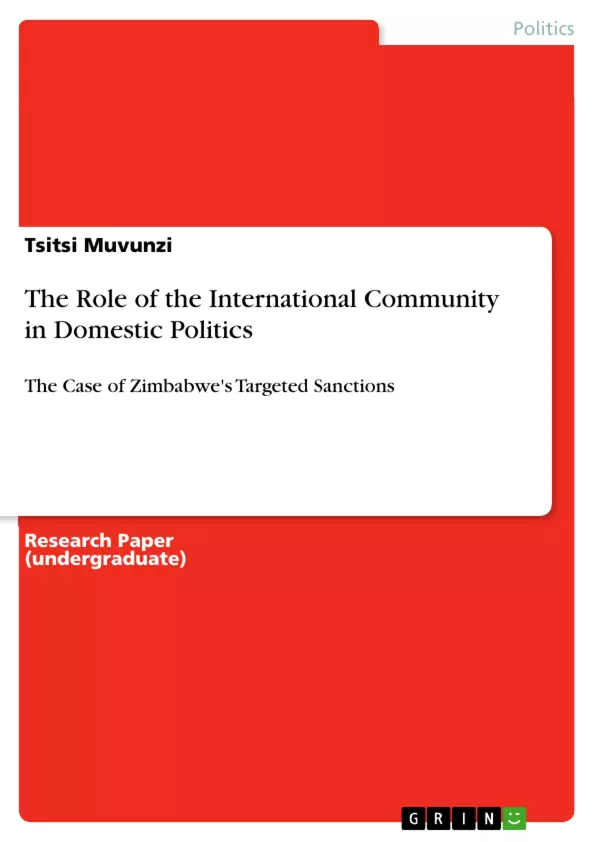This paper examines the impact of the sanctions imposed on Zimbabwe. It provides an in-depth analysis of the effects of targeted sanctions in compelling the targeted group to act favorably. The paper scrutinizes the nature of the targeted sanctions and gives empirical evidence on how their impact has been severely curtailed by non participation of other nations, lack of clarity, inconsistencies in implementation and challenges on the legitimacy of the sanctions among other issues. This article also goes further to analyze the spillover effects of the targeted sanctions particularly on the economic and social service sectors. The article argues that despite the weaknesses inherent in the nature of these sanctions and their spillover effects, the sanctions have facilitated better aid management that has resulted in successful implementation of aid projects without sidelining the government and without the donors being meddled in political squabbles.
Inhaltsverzeichnis (Table of Contents)
- Introduction
- Problem
- Research Questions
- Hypothesis
- Methodology
- Analysis of the Nature of the Targeted Sanctions
- Travel Bans
Zielsetzung und Themenschwerpunkte (Objectives and Key Themes)
This research paper aims to investigate the impact of targeted sanctions imposed on Zimbabwe, specifically examining their effectiveness in compelling the targeted group to adopt favorable policies. The paper will analyze the nature of these sanctions and assess their impact on the target group, considering various factors that may influence their effectiveness.
- The impact of targeted sanctions on compelling the targeted group to act favorably.
- The spillover effects of targeted sanctions on the economy and social services sectors.
- The effectiveness of aid management in the presence of targeted sanctions.
- The challenges and inconsistencies in implementing targeted sanctions.
- The role of non-participation by other nations in undermining the effectiveness of targeted sanctions.
Zusammenfassung der Kapitel (Chapter Summaries)
The Introduction outlines the concept of sanctions as a means of compelling governments to adopt favorable policies. It introduces targeted sanctions as a way to focus the impact on leaders and elites while minimizing collateral damage on the general population. The paper will analyze the case of Zimbabwe and the targeted sanctions imposed by various nations, exploring their effectiveness and consequences.
The Problem section defines the main issue under investigation: the effectiveness of targeted sanctions in influencing national policies without negative spillover effects on the population and economy.
The Research Questions section lays out the central question of the paper: how effective are the sanctions in compelling the target group to change behavior favorably? This section also delves into the spillover effects of the sanctions and their impact on aid management.
The Hypothesis section proposes that the impact of targeted sanctions in compelling favorable actions has been limited due to weaknesses inherent in the nature of these sanctions. It suggests that the sanctions have had negative spillover effects on the economy and social services but may have fostered better aid management.
The Methodology section outlines the approach used in the research, emphasizing the historical and archival analysis of secondary data and documents related to the subject matter. This includes the study of policy documents, speeches, and government reports, as well as media articles and published journals.
The Analysis of the Nature of the Targeted Sanctions section begins by examining the impact of travel bans. While initial restrictions may have been effective, non-compliance from other nations and the ability of targeted individuals to circumvent these bans have ultimately limited their effectiveness.
Schlüsselwörter (Keywords)
This research paper focuses on targeted sanctions, Zimbabwe, international community, political change, economic impact, social impact, aid management, spillover effects, travel bans, effectiveness, and non-compliance. The work examines the application of targeted sanctions in a real-world context, analyzing their impact on both the target group and wider societal outcomes.
Frequently Asked Questions
What is the impact of targeted sanctions on Zimbabwe?
The sanctions aim to compel the ruling group to adopt favorable policies. However, their effectiveness has been limited due to non-participation by other nations and implementation inconsistencies.
How do travel bans affect the targeted individuals?
While travel bans restrict movement, targeted individuals often circumvent them, and the lack of global compliance further weakens their impact as a coercive tool.
What are the "spillover effects" of these sanctions?
Despite being "targeted" at elites, the sanctions have had negative indirect effects on Zimbabwe's broader economy and social service sectors.
Have sanctions improved aid management in Zimbabwe?
The article argues that sanctions have facilitated better aid management, allowing donors to implement projects successfully without being meddled in political squabbles.
Why is the legitimacy of the sanctions challenged?
The lack of clarity in objectives and the fact that not all nations participate lead to challenges regarding the international legitimacy and overall pressure exerted by the sanctions.
- Quote paper
- Tsitsi Muvunzi (Author), 2011, The Role of the International Community in Domestic Politics, Munich, GRIN Verlag, https://www.grin.com/document/213401



